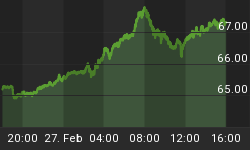Reducing the U.S. trade deficit has been a key plank of President Trump’s policies—and a big reason why he has been playing hardball with U.S. trading partners. With that in mind, the latest revelation that the key metric has been expanding under his watch will probably rile him and give the Republican administration some food for thought.
A trade deficit, or surplus, is the difference between how much goods and services a country imports from other countries and how much it exports. A trade deficit is said to occur when imports to a particular country or region outstrip exports.
The latest data shows that in 2018, U.S. trade deficit with the rest of the world jumped to $621billion (£472.5 billion), a 10-year high. As a share of the economy, the deficit widened to 3 percent of GDP to 2.8 percent the previous year.
Still, the gap is only half the 6 percent average in the decade preceding the Great Recession.
Trump’s policies to blame
The U.S. trade deficit with the rest of the world widened to $1.01 trillion last year from $935.3 billion the previous year after eliminating the influence of currency fluctuations. The petroleum gap, however, shrunk to $141.7 billion as U.S. crude exports increased.
It’s not like the rest of the world has suddenly gone cold on U.S. products, though.
Official data shows that both imports to, and exports from, the country grew, only that imports grew significantly faster thus widening the deficit. Exports during the period grew $148.9 billion but imports grew at an even faster clip--$217.7 billion. The $59.8 billion gap is the biggest since 2008.
One notable exception to that trend is China. The Chinese actually bought less American goods in 2018 than they did the previous year, yet Americans continued buying Chinese merchandise at a torrid pace. The trade deficit between the U.S. and China widened by $43.6 billion to $419.2 billion as U.S. exports to China fell while imports rose.
Trump has frequently cited the long-standing trade deficit between the U.S. and its trading partners as evidence that his predecessors’ trade policies had failed. He has even accused countries like China of ripping off the United States and demanded that they lower their tariffs on U.S. goods and also buy more of them.
Related: Abysmal Retail Sales Have Wall Street Scratching Head
Yet in the two years he has served as president, the trade gap has grown to $119 billion, and it’s not clear that it will shrink significantly even if he completes an accord to end tariff wars with China as cooling global growth is set to continue weighing on exports while healthy domestic demand keeps the import economy thriving.
Trump’s trade policy are actually to blame for an even bigger trade deficit last year. The 25 percent tariffs that he threatened to impose on Chinese imports led to a phenomenon known as frontloading, whereby importers rushed to stockpile on goods ahead of the new duties as evidenced by a sharp increase in incoming traffic at West Coast ports.
Conversely, the retaliatory tariffs by Beijing took a big hit on major U.S. agricultural products such as soybeans with soybean shipments declining $4 billion.
Moreover, Trump’s threat to impose tariffs on the European Union led to a similar effect by slowing the region’s appetite for American goods while encouraging U.S. importers to binge on EU products.
In 2018, the deficit between the U.S. and the EU also increased by $17.9bn to $169.3bn. Encouragingly, Washington lifted tariffs on EU steel and aluminum after Trump and EC president, Jean-Claude Juncker, reached a truce last year and might choose to do the same to European car and parts.
Trade deficits are Ok
Many experts do not share Trump’s obsession with trade deficits. In fact, some contend that a trade gap could be a sign of a healthy economy. For decades, the U.S. normally runs a deficit in merchandise and a surplus in services with goods accounting for roughly three-quarters of America’s total trade.
Is the availability of cheap labor overseas coupled with American profligacy responsible for the widening gap? Probably not; rather, the trigger for the rising deficit probably has its roots nearly half a century ago when President Nixon decided to take the U.S. off the gold standard in 1971. That monumental decision forced global investors to become a lot more selective regarding where they invest their money internationally.
By Alex Kimani for Safehaven.com
















